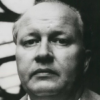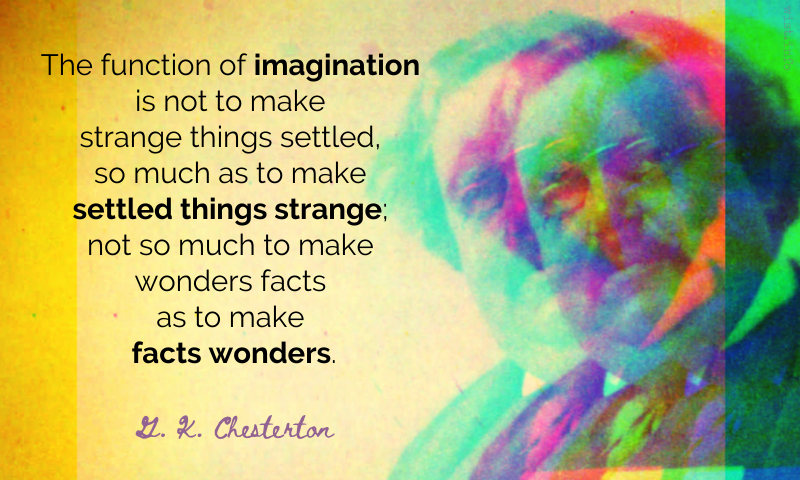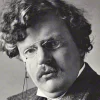Strange roads have strange guides.
Ursula K. Le Guin (1929-2018) American writer
The Farthest Shore, “Lorbanery” [Sparrowhawk] (1972)
(Source)
Quotations about:
strangeness
Note not all quotations have been tagged, so Search may find additional quotes on this topic.
“You,” said Sally Mills, “are very strange.”
“Only,” said Dirk, “as strange as I need to be.”Douglas Adams (1952-2001) English author, humorist, screenwriter
Dirk Gently No. 2, The Long Dark Tea-Time of the Soul, ch. 10 (1988)
(Source)
‘T is strange — but true; for truth is always strange;
Stranger than fiction; if it could be told,
How much would novels gain by the exchange!
How differently the world would men behold!George Gordon, Lord Byron (1788-1824) English poet
Don Juan, Canto 14, st. 101 (1823)
(Source)
Apparent origin of the phrase "Truth is stranger than fiction."
By day the bat is cousin to the mouse.
He likes the attic of an aging house.
His fingers make a hat about his head.
His pulse beat is so slow we think him dead.
He loops in crazy figures half the night
Among the trees that face the corner light.
But when he brushes up against a screen,
We are afraid of what our eyes have seen:
For something is amiss or out of place
When mice with wings can wear a human face.
Originality is a thing we constantly clamour for, and constantly quarrel with; as if, observes our author himself, any originality but our own could be expected to content us! In fact all strange thing are apt, without fault of theirs, to estrange us at first view, and unhappily scarcely anything is perfectly plain, but what is also perfectly common.
Thomas Carlyle (1795-1881) Scottish essayist and historian
“Jean Paul Friedrich Richter,” Edinburgh Review No. 91, Art. 7 (1827-06)
(Source)
A review of Heinrich Döring, Jean Paul Friedrich Richter's Life, with a Sketch of His Works (1826).
Beauty always has an element of strangeness. I do not mean a deliberate cold form of strangeness, for in that case it would be a monstrous thing that had jumped the rails of life. But I do mean that it always contains a certain degree of strangeness, of simple, unintended, unconscious strangeness, and that this form of strangeness is what gives it the right to be called beauty.
[Le Beau est toujours bizarre. Je ne veux pas dire qu’il soit volontairement, froidement bizarre, car dans ce cas il serait un monstre sorti des rails de la vie. Je dis qu’il contient toujours un peu de bizarrerie, de bizarrerie naive, non voulue, inconsciente, et que c’est cette bizarrerie qui le fait être particulièrement le Beau.]
Charles Baudelaire (1821-1867) French poet, essayist, art critic
“The Universal Exhibition of 1855 [Exposition Universelle de 1855],” sec. 1 (1855) [tr. Charvet (1972)]
(Source)
Frequently paraphrased as "Strangeness is a necessary ingredient in beauty." See also Bacon.
Collected in Curiosités Esthétiques, ch. 4 (1868). (Source (French)). Alternate translations:The Beautiful is always strange. I do not mean that it is coldly, deliberately strange, for in that case it would be a monstrosity that had jumped the rails of life. I mean that it always contains a touch of strangeness, of simple, unpremeditated and unconscious strangeness, and that it is in this touch of strangeness that gives it its particular quality as Beauty.
[tr. Mayne (1965)]Beauty is always bizarre. I do not mean to say that it is deliberately, coldly bizarre, for in that case it would be a monster that has escaped from the confines of existence. I mean that it always contains a certain amount of strangeness, naïve strangeness, unforced and even unconscious, and that it is this strangeness that stamps it as Beautiful.
[tr. Gregory (1961)]
But in my college days I discovered that nothing can be imagined which is too strange or incredible to have been said by some philosopher.
[Mais ayant appris dès le collège qu’on ne sauroit rien imaginer de si étrange et si peu croyable, qu’il n’ait été dit par quelqu’un des philosophes.]
René Descartes (1596-1650) French philosopher, mathematician
Discourse on Method [Discours de la méthode], Part 2 (1637) [tr. Cottingham, Stoothoff (1985)]
(Source)
See Cicero. (Source (French)). Alternate translations:For having learnt from the very School, That one can imagin nothing so strange or incredible, which had not been said by some one of the Philosophers.
[tr. Newcombe ed. (1649)]But I had become aware, even so early as during my college life, that no opinion, however absurd and incredible, can be imagined, which has not been maintained by some on of the philosophers.
[tr. Veitch (1901)]But I had been taught, even in my College days, that there is nothing imaginable so strange or so little credible that it has not been maintained by one philosopher or another.
[tr. Haldane, Ross (1911)]One cannot conceive anything so strange and so implausible that it has not already been said by one philosopher or another.
The function of imagination is not to make strange things settled, so much as to make settled things strange; not so much to make wonders facts as to make facts wonders.
Gilbert Keith Chesterton (1874-1936) English journalist and writer
The Defendant, ch. 7 “A Defence of China Shepherdesses” (1901)
(Source)
No, your seriously steeped-in-madness dabbler in the esoteric sciences usually finds themself taxed with a rag-tag collection of hangers-on, typically consisting of minions, constructs, adventurers, and those unique, unclassifiable, individuals whose raison d’être appears to be to remind us of what a strange world it is.
The most absurd customs and the most ridiculous ceremonies are everywhere excused by an appeal to the phrase, but that’s the tradition. This is exactly what the Hottentots say when Europeans ask them why they eat grasshoppers and devour their body lice. That’s the tradition, they explain.
[Les coutumes les plus absurdes, les étiquettes les plus ridicules, sont en France et ailleurs sous la protection de ce mot: c’est l’usage. C’est précisément ce même mot que répondent les Hottentots, quand les Européens leur demandent pourquoi ils mangent des sauterelles, pourquoi ils dévorent la vermine dont ils sont couverts. Ils disent aussi: c’est l’usage.]
Nicolas Chamfort (1741-1794) French writer, epigrammist (b. Nicolas-Sébastien Roch)
Products of Perfected Civilization [Produits de la Civilisation Perfectionée], Part 1 “Maxims and Thoughts [Maximes et Pensées],” ch. 3, ¶ 249 (1795) [tr. Mathers (1926)]
(Source)
(Source (French)). Alternate translations:The most absurd conventions, the most ridiculous formalities enjoy in France and elsewhere the protection of the phrase, "It's the custom.” It is the very phrase with which the Hottentots answer when the Europeans ask them why they eat grasshoppers, why they devour the vermin that crawl on them. They too say, “It’s the custom.”
[tr. Merwin (1969)]The most absurd habits, the most ridiculous matters of etiquette enjoy in France and elsewhere the protection afforded by this phrase: "It is the custom." It is precisely this phrase which Hottentots produce when Europeans ask them why they eat grasshoppers, and why they devour the vermin with which they are infested. They also say: "It is the custom."
[tr. Pearson (1973)]The most absurd customs, the most ridiculous etiquettes, are in France and elsewhere under the protection of this phrase: That's how things are. That is precisely the phrase that Hottentots say when Europeans ask them why they eat locusts; why they consume the vermin that they are covered in. They saÿ: "That's how things are."
[tr. Siniscalchi (1994)]In France and elsewhere, the most absurd customs and protocol are justified by the statement "It's always been done like that." That's exactly what Hottentots tell Europeans when asked why they feed on locusts or the vermin on their bodies: "It's what we've always done."
[tr. Parmée (2003), ¶161]
There is no excellent beauty that hath not some strangeness in the proportion.
Francis Bacon (1561-1626) English philosopher, scientist, author, statesman
“Of Beauty,” Essays, No. 43 (1625)
(Source)
TOUCHSTONE: We that are true lovers run into strange capers.
William Shakespeare (1564-1616) English dramatist and poet
As You Like It, Act 2, sc. 4, l. 53ff (2.4.53) (1599)
(Source)













